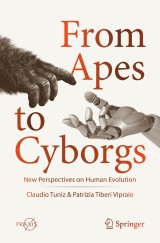Details

From Apes to Cyborgs
New Perspectives on Human EvolutionSpringer Praxis Books
|
CHF 41.50 |
|
| Verlag: | Springer |
| Format: | |
| Veröffentl.: | 29.02.2020 |
| ISBN/EAN: | 9783030365226 |
| Sprache: | englisch |
Dieses eBook enthält ein Wasserzeichen.
Beschreibungen
This book offers fascinating insights into the lives of our ancestors and investigates the dynamic processes that led to the establishment of complex human societies. It provides a holistic view of human history and social evolution by drawing on the latest evidence from a wide range of disciplines and proposes new hypotheses on the origins of human behaviour. After exploration of the encounters of <i>Homo sapiens</i> with other human species, diverse aspects of life in emerging societies are examined, including clothing, work, leisure, learning, diet, disease, and the role of women. Attention is drawn to the key role of self-domestication – the process of reducing natural aggression and increasing playfulness – in enabling survival. Another focus is <i>Homo oeconomicus.</i> The significance of symbolic thought for the emergence of surpluses in goods and services is highlighted, with analysis of how this led to private accumulation of wealth and development of the first hierarchical societies. Finally, the discussion turns to humans of the future and the potential risks posed by artificial intelligence. The aim is to unveil the deep roots of our social behaviour and how it is going to intertwine with the development of digital technologies and social networks.
<p>1 Our deep history: a short overview.- 2 Human biodiversity and close encounters.- 3 The march for hegemony.- 4 The naked ape dresses up.- 5 The evolution of woman.- 6 Work, leisure and learning.- 7 Food for body and mind.- 8 Diseases and grief.- 9 Brain and mind.- 10 Imaginary worlds.- 11 <i>Homo oeconomicus.- </i>12 Humans of the future.- Bibliography.</p>
Claudio Tuniz is a Scientific Fellow of the Abdus Salam International Centre for Theoretical Physics in Trieste, Coordinator of the project SAPIENS (Physics Methods in Human Origin Studies) at the Fermi Centre in Rome, and Honorary Professor at the Centre for Archaeological Science in Australia. He is editor-in-chief of the <i>Journal of Archaeological and Anthropological Sciences</i> (Springer Nature) and has authored <i>The Bone Readers</i> (with R. Gillespie and C. Jones; Routledge, 2009; Springer Nature, 2010), <i>Radioactivity </i>(Oxford University Press, UK, 2012; Carocci, 2013), <i>The Science of Human Origins</i> (with G. Manzi and D. Caramelli; Laterza, 2013; Routledge, 2014), and <i>Humans</i> (with P. Tiberi Vipraio; Carocci, 2015; Springer Nature, 2016).<p>Patrizia Tiberi Vipraio was Full Professor of Economic Policy and Associate Professor of International Economics at the University of Udine, Italy, where she also lectured on Monetary Policy and Industrial Economics. Shehas been associated with various universities in Europe and Australia. She has authored a number of academic papers and books, including <i>Dal mercantilismo alla globalizzazione </i>(From Mercantilism to Globalization)<i> </i>(Il Mulino, Bologna, 1999) and <i>Humans</i> (with Claudio Tuniz; Carocci, 2015; Springer Nature, 2016).</p>
This book offers fascinating insights into the lives of our ancestors and investigates the dynamic processes that led to the establishment of complex human societies. It provides a holistic view of human history and social evolution by drawing on the latest evidence from a wide range of disciplines and proposes new hypotheses on the origins of human behaviour. After exploration of the encounters of <i>Homo sapiens</i> with other human species, diverse aspects of life in emerging societies are examined, including clothing, work, leisure, learning, diet, disease, and the role of women. Attention is drawn to the key role of self-domestication – the process of reducing natural aggression and increasing playfulness – in enabling survival. Another focus is <i>Homo oeconomicus.</i> The significance of symbolic thought for the emergence of surpluses in goods and services is highlighted, with analysis of how this led to private accumulation of wealth and development of the first hierarchical societies. Finally, the discussion turns to humans of the future and the potential risks posed by artificial intelligence. The aim is to unveil the deep roots of our social behaviour and how it is going to intertwine with the development of digital technologies and social networks.
Latest evidence on how complex human societies emerged New hypotheses on the origins of modern human behavior Holistic analysis drawing on various disciplines Examination of the risks as artificial intelligence emerges

















